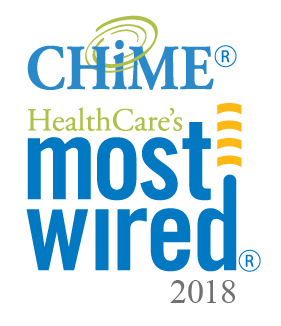LMH Named 2018 CHIME HealthCare’s Most Wired Recipient
 Licking Memorial Hospital (LMH) recently was recognized as one of CHIME HealthCare’s Most Wired Hospitals for 2018. Hospitals and health systems at the forefront of using healthcare information technologies (IT) to improve the delivery of care have maximized the benefits of foundational technologies and are embracing new technologies that support population management and value-based care. The most successful organizations not only adopt technology, but apply it strategically to achieve great outcomes, according to an analysis of the College of Healthcare Information Management Executives (CHIME) HealthCare’s Most Wired survey results.
Licking Memorial Hospital (LMH) recently was recognized as one of CHIME HealthCare’s Most Wired Hospitals for 2018. Hospitals and health systems at the forefront of using healthcare information technologies (IT) to improve the delivery of care have maximized the benefits of foundational technologies and are embracing new technologies that support population management and value-based care. The most successful organizations not only adopt technology, but apply it strategically to achieve great outcomes, according to an analysis of the College of Healthcare Information Management Executives (CHIME) HealthCare’s Most Wired survey results.
HealthCare’s Most Wired, now in its 20th year, traditionally tracked the adoption of healthcare IT in hospitals and health systems. CHIME took over the Most Wired program and revised the survey questions and methodology this year to highlight strengths and gaps in the industry. The goal is to identify best practices and promote the strategic use of healthcare IT to elevate the health and care of communities around the world.
“We are pleased to be recognized for a fifth year at the national level for our efforts to improve the health of our community,” said Rob Montagnese, Licking Memorial Health Systems (LMHS) President & CEO. “For a number of years, we have been heavily focused on implementing advanced clinical systems at the point of care that directly impact the quality of care provided to our patients. Those efforts include adopting technologies to support the instantaneous documentation of patient care, using integrated computer systems with advanced clinical decision support tools, and reducing the likelihood of medication errors through the use of electronic tools such as Computerized Provider Order Entry (CPOE) and Barcoded Medication Verification. In addition, information systems provide easy access to clinical information in a secure manner, and access to that information can readily be restored in the case of a disaster or outage.”
The report found two key areas that emerged in 2018: the use of foundational technologies, such as integration, interoperability, security and disaster recovery; and the use of transformational technologies to support population health management, value-based care, patient engagement and telehealth. These foundational pieces need to be in place for an organization to leverage tools to effectively transform healthcare.
“Research has shown that information technology can be a powerful tool in supporting the delivery of high quality patient care, said Sallie Arnett, M.S., RHIA, CHCIO, LMHS Vice President Information Systems. “For many years, we have used technology to assist physicians, nurses, and other members of the clinical staff in making informed patient care decisions, improving patient outcomes, and reducing medical errors. With the recent introduction of the LMH Patient Portal, patients are directly engaged in their care with real-time access to nearly all relevant clinical information.”
LMH provides digital diagnostic images from Radiology, Cardiovascular Imaging, Mammography, Neuroimaging and Nuclear Imaging to the appropriate care provider regardless of the provider’s location, and integrates those images with the EMR. Voice communication using the unique hands-free Vocera devices, worn by nearly every member of the clinical staff, occurs over the secure wireless network. In addition, Vocera devices allow patients to communicate directly with nurses by activating the nurse call button. LMH also utilizes patient monitoring equipment which sends data directly into the EMR, including bedside blood pressure, pulse oximetry, temperature, glucose, lab tests and fetal monitoring.
Information security also has been a key focus of the Information Systems Department at LMH in recent years. The Information Security team is focused on the confidentiality, integrity and availability of patient information. “We respect the privacy of our patients’ information and do our best to ensure that our information systems remain private, the information contained within the medical record is accurate, and that our systems are operating at peak efficiency for patient care,” Sallie added.
The annual survey is designed to measure the level of IT adoption in U.S. hospitals and health systems, and serves as a tool for hospital and health system leadership to map their IT strategic plans. The four focus areas of the survey include: infrastructure and security; business and administrative management, clinical quality and safety (inpatient/outpatient hospital) and clinical integration (ambulatory/physician/patient/community). According to the survey, hospitals are ramping up their efforts to stop hackers and also working to boost their capabilities in telehealth and population health. There has also been an increased emphasis on clinical staff training.